Elstree
Coordinates: 51°38′N 0°18′W / 51.64°N 0.30°W
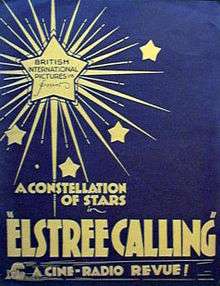
Elstree /ˈɛlztri/ is a village in the Hertsmere borough of Hertfordshire, England, on the former A5 road, which followed the course of Watling Street, approximately thirteen miles northwest of central London. In 2011, its population was 5,110.[1] It forms part of the civil parish of Elstree and Borehamwood, originally known simply as Elstree.
The village often lends its shorter name to businesses and amenities in the adjacent town of Borehamwood, and the names of Elstree and Borehamwood are used interchangeably. Elstree is perhaps best known for the Elstree Film Studios, where a number of famous British films were made, and the BBC Elstree Centre, where the TV soap opera EastEnders is made; these are both located in Borehamwood.
The local newspaper is the Borehamwood and Elstree Times.[2] Together with Borehamwood, the village is twinned with Offenburg in Germany and Fontenay-aux-Roses in France.[3]
Transport
Elstree & Borehamwood railway station
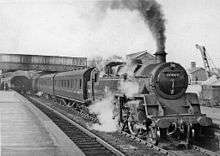
Elstree & Borehamwood railway station is on the Thameslink Line between London St Pancras and Bedford. It was built by the Midland Railway in 1868, and is located just north of the 1,072 yard long Elstree Tunnels.[4]
The area of Borehamwood to the west of the railway line, formally Deacon's Hill, is colloquially called Elstree even though it is not contiguous with the village. Elstree South tube station was due to be an extension of the Northern line, planned in the 1930s, but never completed.
Road links
The old A5 road (Watling Street) goes through Elstree village, where it is designated as the A5183 road. Through the village, the road is called (from south to north) Elstree Hill South, High Street and Elstree Hill North. The 18th century Grade II listed building, Elstree Hill House, is still on Elstree Hill South, and used to be the home of the old Elstree School (see Schools). In the early 1900s, it was noted that:
- ".. the hill roads are remarkably direct and seldom curve to avoid the steep pitch, and it has been suggested that the roads were originally slides for the timber which used to be sent to London for fuel."[5]
Elstree Aerodrome
Elstree Aerodrome is licensed by the CAA and has a 2,150-foot (717 yd; 655 m) paved runway, suitable most for light aircraft and turbine powered G A aircraft. It also is one of the main helicopter centres for North London and is extending its provision in this area. In the early 1930s it was a grass landing strip for the local Aldenham House country club.[6] A concrete runway was put down during World War II, and Wellington Bombers were modified here.[7]
On 29 November 1975, retired F1 race car driver and Embassy Hill car owner Graham Hill and his racing driver Tony Brise were piloting a twin-engine six-seat Piper PA-23-250 Aztec (N6645Y) from France to London with four additional team members aboard. All six were killed when it crashed and burned in heavy fog on Arkley Golf Course, 3 miles (5 km) short of the runway.[8][9][10]
London Transport works
London Transport's Aldenham Works was sited on the edge of Elstree close to the A41; it was opened in 1956, closed in 1986, and demolished in 1996. It is now a large business park.
Elstree Grange
Originally a 19th-century steam ship owned by the Houlder Brothers,[11] the town also lends its name to a series of ships called the Elstree Grange (rebuilt 1916, 1944, 1979),[12] at one time sunk during the Second World War.[13]
Buildings
Grade II listed buildings
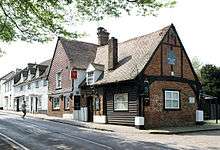
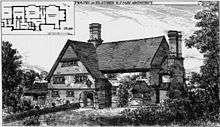
Elstree is home to a number of Grade II listed buildings, including some at Grade II* (particularly important buildings), such as:
- Holly Bush public house (15th century)[14]
- Aldenham House and stable block (c.1672)[15]
- The Leys, built in 1901 by Scottish architect and designer, George Henry Walton.[16][17]
Laura Ashley The Manor Hotel
Laura Ashley The Manor Hotel, formerly known as the Edgwarebury Hotel,[18] is located on Barnet Lane, and operated by Corus Hotels.[19] The Tudor-style building dates back to 1540, was converted into a hotel in the 1960s, and has featured in many TV and film productions, such as the 1968 Hammer Horror classic, The Devil Rides Out. Notable guests have included Peter Sellers, Tom Cruise, John Cleese and Stanley Kubrick.[20] It was the country home of armaments manufacturer and First Baronet Sir (Arthur) Trevor Dawson, (1866–1931).[21]
Other buildings
A house in Elstree designed by architect Edward John May (1853–1941) was exhibited at the Royal Academy in 1887. St Nicholas Parish Church was designed by English architect Philip Charles Hardwick.[22]
Schools
Elstree is home to Aldenham School, and Haberdashers' Aske's Boys' School, both independent public schools (ie. fee-paying), Haberdashers' Aske's School for Girls, and St Nicholas Church of England V.A Primary School.[23]
Earlier schools
Since the 1780s, a private school has been located in Elstree.[24]
Elstree School, a boys' preparatory school, was located in Elstree from 1848 until 1938 before moving to Woolhampton, Berkshire before the outbreak of the Second World War.
Hillside School was located in Elstree between 1874 and 1886, before eventually becoming Dorset House School in 1905,[24][25] (not to be confused with Hillside School in nearby Borehamwood.)
Recreation
Sport
Elstree Cricket Club was formed in 1878,[26] but no longer play in the Herts Saracens League.[27][28] 18-hole Radlett Park Golf Club was founded in 1984,[29] having recently being renamed from Elstree Golf & Country Club.[30] It is closer to Elstree than Radlett.
Hatch End Cricket Club also play in Elstree. They participate in the Herts Saracens League.
Leisure
Section 15 of the London Outer Orbital Path (London Loop) goes through Elstree,[31] before continuing as Section 16, a 10-mile (16 km) walk from Elstree to Cockfosters.[32][33]
Business and local services
Bush, Alba and Cyber-Duck are based in Elstree. There is a local doctor's practice called Shopwick Surgery. There is one convenience store, pubs and a restaurant. A liberal synagogue and the newly built shteibel are off Elstree Hill.
Synagogue
Elstree was home to Ohr Yisrael Synagogue, a warm and friendly Orthodox synagogue with affiliation to the Federation of Synagogues. However, the synagogue's present location is just within Borehamwood.
Parks
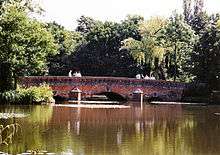
Aldenham Country Park is both a recreational facility and a breeding centre for rare livestock. Section 15 of the London Loop walk passes by.[31] In 1873 nearby Tykes Water stream was dammed in order to create Tykes Water lake.[34] Tykes Water Bridge features in the open credits to the Peter Cushing and Christopher Lee film, Dracula A.D. 1972,[35] and used in several episodes of the Diana Rigg and Linda Thorson seasons of The Avengers, including the final Thorson opening titles.[36]
Elstree Reservoir
The dam was built in 1795 by French prisoners of war.[37] English watercolour landscape painter John Hassell writes:
- "At the top of Stanmore Hill we enter on Bushy Heath, and at some distance on the right in the valley catch a view of the celebrated reservoir, the property of the Grand Junction Company, on Aidenham Common, at the foot of the village of Elstree. This noble sheet of water occupies a space of considerable extent on the verge of Aidenham Common, which thirty years ago was a barren waste; here the improvements in agriculture are indeed conspicuous, for at this place a poor, sandy, meagre, wretched soil has now by good husbandry been converted into rich pasturage.
- "The reservoir has all the appearance of a lake; and when the timber that surrounds it shall have arrived at maturity, it will be a most delightful spot. From this immense sbeet of water, in event of drought or a deficiency of upland waters, the lower parts of the Grand Junction and the Paddington Canals can have an immediate supply. The feeder from this reservoir enters the main stream near Rickmansworth, above Batchworth Mills, and supplies the millers' below with 300 locks of water, to whose interest the Duke of Northumberland is a perpetual trustee."[38]
In 1886, the Photographic Society of Great Britain featured an exhibition of photos of Elstree Reservoir by Edgar Clifton.[39] During World War I, then Major Keith Caldwell with No. 74 Squadron RAF, used Elstree Reservoir for target practice.[40] In 1918, one of the pilots accidentally killed a local resident when his machine gun misfired.[41]
Climate
| Climate data for Elstree | |||||||||||||
|---|---|---|---|---|---|---|---|---|---|---|---|---|---|
| Month | Jan | Feb | Mar | Apr | May | Jun | Jul | Aug | Sep | Oct | Nov | Dec | Year |
| Average high °C (°F) | 6 (43) |
7 (45) |
9 (48) |
12 (54) |
16 (61) |
18 (64) |
22 (72) |
22 (72) |
18 (64) |
14 (57) |
9 (48) |
7 (45) |
13.3 (56.1) |
| Average low °C (°F) | 1 (34) |
1 (34) |
2 (36) |
4 (39) |
6 (43) |
9 (48) |
11 (52) |
11 (52) |
10 (50) |
7 (45) |
3 (37) |
2 (36) |
5.6 (42.2) |
| Average precipitation mm (inches) | 69.6 (2.74) |
47.2 (1.858) |
54.1 (2.13) |
53.1 (2.091) |
49.8 (1.961) |
60.5 (2.382) |
41.1 (1.618) |
53.6 (2.11) |
61.0 (2.402) |
74.4 (2.929) |
66.0 (2.598) |
67.6 (2.661) |
698 (27.48) |
| Source: Monthly averages for Borehamwood, United Kingdom The Weather Channel'.' Retrieved 15 October 2011 | |||||||||||||
History
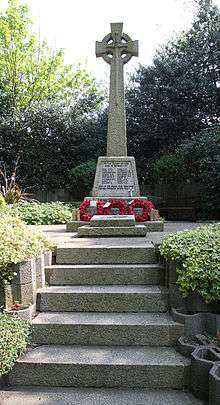
Etymology
The name "Elstree" derives from the Anglo-Saxon phrase "Tidwulf's Tree", which is mentioned as "Tidulfres treow" in an 11–12th-century manuscript of an A.D. 786 charter.[42][43] It is thought that "the "T" being lost in the wrong division of 'aet Tidwulfes treo'"[44] (meaning "at Tidwulf's Tree").
In 1723, topographer John Norden noted in his book Speculum Britanniae, that in the country of Hartfordshire (sic) was one "Elstre or Eglestre".[45] In an earlier edition, he writes:[46]
- "ELSTREE n. 20. in OFFAES grant EAGLESTRE
- Nemus aquilinum: a place wherit may be thought Eagles bredd in time past, for though it be nowe hilly and heathy – it hath beene replenished with stately trees, fit for such fowle to breede and harbour in. It is parcell of the libertie of S. Albans.
Nemus aquilinum is the Latin for "grove of eagles".
Robinson Crusoe author, Daniel Defoe wrote in his 1748 travel guide that:
- "Idlestrey or Elstre, is a Village on the Roman Watling-street, on the very Edge of Middlesex; but it is chiefly noted for its Situation, near Brockly-hill, by Stanmore, which affords a lovely View cross Middlesex, over the Thames, into Surry."[47]
In 1811, topographer Daniel Lysons writes:
- "The name of this place has been variously written; — Eaglestree, Elstree, Ilstrye, Idlestrye, etc. Norden says that it is called, in Offa's grant to the Abbey of St. Alban's, Eaglestree, that is, says he, "Nemus aquilinum, a 'place where it may be thought that eagles bred in time past'." It has been derived also from Idel-street, i.e. the noble road; and Ill-street, the decayed road. May it not have been, rather, a corruption of Eald-street, the old road, i.e. the ancient Watling-street, upon which it is situated?"[48]
5th century: Battle of Ailestreu (Elstree)
In the 5th century, British warlord Vortigern and his two sons, Vortimer and Catigern, took part in the Battle of Elstree, then called the Battle of Ailestreu,[49] where the Saxon Horsa was killed. It's possible there is confusion with the Battle of Aylesbury. George Moberly writes:
- "Nennius, M.H.B. p. 69, calls the place of battle where Hors fell Episford; Britannicè 'Sathenegabail' = the Saxon battle. The Saxon Chronicle, ad a. 455, calls it Ægæles-threp, and Henry of Huntingdon, M.H.B. p. 708, Ailestreu. This would naturally be Elstree, of which name there is a place in Herts; but Beda's description of its situation has caused it rather to be referred to Aylesford in Kent, near which is a small village called Horsted."[50]
16th – 18th centuries
The Manor of Elstree was formerly included in the Manor of Parkbury, and belonged to the Abbey of St. Albans. On the Dissolution of the Monasteries, it was granted by Henry VIII, to Anthony Denny (1501–1549).[51][52]
In 1607, Anthony Denny's grandson Edward Denny sold part of the estate, with all manorial rights, to Robert Briscoe, who sold it the same year to Sir Baptist Hicks. Part of the estate became the Manor of Boreham, and was sold to Edward Beauchamp. It remained with the Beauchamp-Proctor family until 1748,[53] when it was sold to James West, M.P. for St. Albans, who, in or about 1751, alienated it to a Mr Gulston of Widdial. Gulston then sold it to a Mr Pigfatt, a gunsmith, who, within a few years, conveyed it to Thomas Jemmet. In 1774 it was purchased from Mr Jemmet by the late George Byng, M.P. for Middlesex, who passed it on to his son, by which time the estate was called the Manor of Boreham.[51]
In 1776, the House of Lords granted:
- "An Act for dividing and closing the Common or Waste Ground, called Boreham Wood Common, in the Parish of Elstree otherwise Idletree, in the County of Hertford."[54]
In 1796 topographer Daniel Lysons writes:
- "The parish of Elstree contains about 3,000 acres of land, which is divided between arable and pasture nearly in an equal proportion. The soil is, for the most part, clay. Boreham Wood, a waste of nearly 700 acres, was inclosed about the year 1778, and is now in culture. This parish pays the sum of £151 11s 0d to the land-tax, which is raised by a rate of about 1s 9d in the pound".[55]
Murders

Martha Ray murder
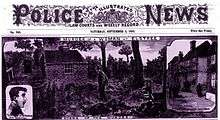
In 1779, Martha Ray (c. 1742–1779), singer and mistress of John Montagu, 4th Earl of Sandwich, was buried in the parish church (illustrated, right) after she had been shot dead by the Rev. James Hackman, Rector of Wiveton in Norfolk.[56]
The Elstree murder of William Weare
In 1823 Elstree became notorious for the Elstree murder of William Weare, killed in Radlett and the body disposed of in a pond in Elstree by John Thurtell.[57] The incident was recalled by Charles Dickens in his Weekly Journal.[58] An inquest of the deceased was held on 31 October by county coroner Benjamin Rooke at the local Artichoke public house.[59]
The Elstree murder of Eliza Ebborn
On 17 August 1882, Eliza Ebborn of Watford was murdered by 24-year-old shoemaker George Stratton, who was subsequently sentenced to death.[60][61] She was buried at Elstree Parish Church.[62]
Administrative districts
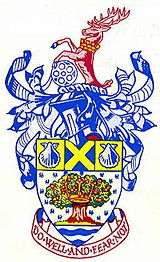
Elstree used to be in the Hundred of Cashio, also known as the Liberty of St Albans.
Elstree Rural District
From 1941 to 1974, Elstree Rural District was the local government area, before being abolished and merged with Hertsmere. On 20 March 1957, Armorial Bearings were granted. The arms and crest are described as follows:
- The background of royal ermine, represents the royal visits to and associations with the district, principally the visit of Henry VIII and his court to Tyttenhanger in 1525 to avoid the "sweatinge sicknesse" and the visits of Charles II to Salisbury Hall in Shenley. The oak tree with the Saxon crown represents Saxon Elstree – "Tidwulf's tree" – around which the district has grown. The tree also represents Boreham Wood and the district's woodlands, the gold acorns symbolize growth and prosperity. The waves at the base represent the River Colne, Aldenham Reservoir and link with the waves in the arms of the Hertfordshire CC and the Greater London Council.The gold saltire on blue is from the arms of the Abbey of St. Albans, the manor of Elstree came into the possession of the Abbey in 1188, and Tyttenhanger in Ridge stands on the site of a former possession of the Abbey, and the whole area lies in the Liberty of St. Albans. The scallop shells, the badge of pilgrims, recalls their passage along Watling Street through Elstree to St. Albans.
- The hart is from one of the supporters of the County Council arms, wearing a mural crown, symbol of civic government. The spool of film (unique in civic heraldry) recalls the industry which had made the name of Elstree and Boreham Wood so widely known in modern times.
- The motto is taken from the wall of Shenley Cage, and also links with the County motto "Trust and fear not". "[63]
Clubs, societies and organisations
- Elstree And Boreham Wood History Society, (inc. Elstree and Borehamwood Museum)[64]
- Elstree, Borehamwood & Radlett mencap Society.[65]
- Elstree Golf & Country Club.[66]
References in the media
- Elstree is replicated as a part of one of three maps is based in the game Urban Dead. The "Borehamwood" map was released as part of the promotional campaign for the release of British writer Charlie Brooker's Dead Set.
- "Elstree" is also the title of a song about the film studio by the Buggles on their 1979 album The Age of Plastic.
- St. Nicholas Church, Elstree featured in an investigation of paranormal investigation
Notable residents
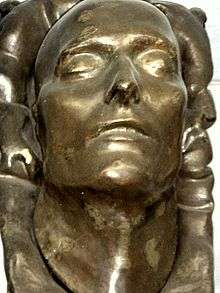
- John Baxter (1896–1975), film director and producer, lived at Aldahvu, Elstree[67]
- Ephraim Beauchamp (d.1728) Baronet and lord of the Manor of Boreham in the parish of Elstree.[68]
- Gerry Blattner (1913-1992 approx.), film producer and studio executive.[69]
- Ludwig Blattner (1881-1935), film producer and studio owner, lived in Elstree from about 1928 until his suicide at Elstree Golf & Country Club.[70]
- John Boyle (1563–1620), Church of Ireland Bishop of Cork, Rector of Elstree (before 1610).[71]
- Ralph Terence St John-Brooks (1884–1963), bacteriologist, was stationed at the Lister Institute's National Collection of Type Cultures.[72]
- Francis Burton M.D. (d.1828), uncle of Richard Francis Burton, military surgeon who made Napoleon's Death Mask, lived at Barham House, and is buried in Elstree parish church.[73][74]
- Richard Francis Burton (1821–1890), explorer who lived at Barham House in Elstree.
- George Byng, Esq. M.P. for Middlesex, resident of Elstree Manor.[51]
- Rev. Philip Caraman (1911–1998), Jesuit, lived at The Grange on the corner of Allum Lane and Deacons Hill Road.[75][76]
- Hussein Chalayan, fashion designer was brought up in The Rise
- Tom Chatto (1920–1982) – actor, brought up in Elstree
- Dame Harriette Chick (1875–1977), nutritionist, tested and bottled tetanus antitoxin for the army in 1915.[77]
- Joan Collins, actress and author, lived in Barnet Lane, while married to Anthony Newley, Singer, actor and film composer
- Samuel Tertius Cowan (1905–1976), bacteriologist, curator of the National Collection of Type Cultures (NCTC) at the Lister Institute.[78]
- Simon Cowell, the American Idol and X Factor judge, was brought up in Elstree.
- Sir (Arthur) Trevor Dawson, first baronet (1866–1931), armaments manufacturer, lived at Edgewarebury House.[21]
- Colonel John Drinkwater, the historian of the Siege of Gibraltar, had his family seat at Palmer's Lodge,[79] (now called Radnor Hall)[80]
- Anthony Denny, Esq (1501–1549), resident of the Manor or Elstree.[51]
- Sir Edward Denny (1796–1889) composer, resident of Manor of Elstree.[51]
- James Elphinston (1721–1809) Scottish educator, moved to Elstree in 1792.[81]
- Percy Everett (1870–1952), became the first Scoutmaster of the 1st Elstree Scout group on 13 March 1908,[82] was Deputy Chief Scout for Great Britain,[83] lived at Schopwick Place in Elstree.[84]
- Andrew Feldman (b. 1966) Conservative politician appointed to the Lords is known as Baron Feldman of Elstree.
- Cecil Ford (1913–1994) cricketer, was born in Elstree.
- Vicary Gibbs (1853–1932), genealogist and gardener, lived at Aldenham House.[85]
- Lew Grade (1906–1998) TV producer given a life peerage, was known as Baron Grade, of Elstree.
- Thomas Greenwood (1851–1908), public libraries promoter, died at Frith Knowl, Elstree.[86]
- James Hackman (1752–1779), murderer of Martha Ray, was buried in Elstree Parish Church.[87]
- Sir Harry Hague (1881–1960), managing director of A. Wander Ltd, the company who made Ovaltine, lived at The Chantry, Barnet Lane, Elstree.[88]
- David Willis Wilson Henderson (1903–1968), immunologist, worked at the Lister Institute.[89]
- Thomas Knox, 2nd Earl of Ranfurly M.P. (1786–1858) Member of Parliament (1820–1832) resided at Barham House, Elstree.[90]
- Sir John Charles Grant Ledingham (1875–1944), bacteriologist, worked at the Lister Institute.[91]
- Paul Lester, music journalist.
- Ian Livingston, Chief Executive Officer of BT Group
- William Macready (1793–1873), actor, lived at Elm Place, Elstree.[92]
- John Henry Marks (b. 1925) General Practitioner and Chairman of the British Medical Association, lived on Barnet Lane.[93]
- Air Vice-Marshal Sir David Munro, K.C.B., C.I.E., LL.D., M.B., F.R.C.S.Ed. (1878–1952)[94][95]
- Archer John Porter Martin (1910–2002), Nobel Prize winning biochemist, worked at the Lister Institute, and lived at Abbotsbury on Barnet Lane.[96]
- Walter Thomas James Morgan (1900–2003), biochemist. worked at the Lister Institute.[97]
- Anna Neagle and her film director husband Herbert Wilcox lived at the junction of Deacons Hill Road and Barnet Lane, during her years as a film star.[98]
- Richard Tauber, tenor, and his actress-wife Diana Napier lived at the Villa Capri from 1936–1940. It was later demolished to form a new residential development, called 'Tauber Close'.[99]
- Frank Podmore (1856–1910) author and founding member of the Fabian Society was born in Elstree.[100]
- Martha Ray (c.1742–1779), singer murdered by James Hackman buried in Elstree Parish Church.[101]
- Horatio Sharpe (1718–1790), army officer and Proprietary Governor of Maryland, buried at Elstree Parish Church.[102]
- Winston Smith, spaniel dog breeder.[103]
- Henry Hurd Swinnerton (1875–1966), zoologist and geologist, lived and died at the Headmaster's House, Haberdashers' Aske's School.[104]
- James Booker Blakemore Wellington (1858–1939) photographer, died in Elstree in 1939.[105]
- James West, Esq. M.P. for St. Alban's, resident of Elstree Manor.[51]
- Jeremiah White (1629–1707), nonconformist minister, preached at Elstree in 1669.[106]
References
- 1 2 "Population Density, 2011 (QS102EW)", Neighbourhood Statistics, 2011 Census, Office for National Statistics, retrieved 3 February 2011
- ↑ Borehamwood and Elstree Times (Website). This was originally the Boreham Wood and Elstree Post, and before that, Boreham Wood & Elstree Local (see British Library record)
- ↑ "The Borehamwood and Elstree Twin Town Association" website. Retrieved 22 September 2011
- ↑ E. A. Labrum, Civil engineering heritage: Eastern and central England, Publisher Thomas Telford, 1994, ISBN 0-7277-1970-X, 9780727719706, 282 pages (page 197)
- ↑ 'Parishes: Elstree', A History of the County of Hertford: volume 2 (1908), pp. 349–351. Date accessed: 20 September 2011. Refers to "Middlesex and Herts Notes and Queries, ii, 190"
- ↑ Richard Riding and Grant Peerless, Elstree Aerodrome: The Past in Pictures, The History Press Ltd (26 November 2003), ISBN 0-7509-3412-3, ISBN 978-0-7509-3412-1, 192 pages. (Back cover)
- ↑ John M. Houlder, C.B.E., "History of Elstree Aerodrome", at Firecrest Aviation Ltd website. Retrieved 20 September 2011
- ↑ "Plane crash kills driver Graham Hill". Pittsburgh Press. (Pennsylvania, U.S.). UPI. November 30, 1975. p. D-1.
- ↑ "Racing mourns death of Graham Hill". Milwaukee Sentinel. (Wisconsin, U.S.). UPI. December 1, 1975. p. 5, part 2.
- ↑ "After cheating death 20 years, Hill killed in air crash". Daytona Beach Morning Journal. (Florida, U.S.). Associated Press. December 1, 1975. p. 1C.
- ↑ Report of the executive committee ... adopted at the annual meeting ..., Issue 15, Publ. Newport Chamber of Commerce (Newport, England), 1899
- ↑ Marine news, Volume 54, World Ship Society, 2000 (page 578)
- ↑ John Malcolm Slader, The fourth service: merchantmen at war, 1939–1945, Publisher Hale, 1994, ISBN 0-7090-4848-3, ISBN 978-0-7090-4848-0, 347 pages (page 41)
- ↑ "Holly Bush Public House", List entry Number: 1103589, at English Heritage. Retrieved 20 September 2011
- ↑ "Aldenham House and Stable Block", List entry Number: 1346891, at English Heritage. Retrieved 20 September 2011
- ↑ Hermann Muthesius, The English House, Volume 2, Publisher Frances Lincoln ltd, 2006, ISBN 0-7112-2688-1, ISBN 978-0-7112-2688-3, 768 pages (pages 188–190)
- ↑ "The Leys", List entry Number: 1263392, at English Heritage. Retrieved 20 September 2011
- ↑ "The Hotel". Laura Ashley Hotels. Retrieved 9 June 2014.
- ↑ The Edgwarebury Hotel, website. Retrieved 20 September 2011
- ↑ Derek Pykett, Freddie Francis, Simon Flynn, "Edgwarebury Corus Hotel", British Horror Film Locations, Publisher: McFarland, 2008, ISBN 0-7864-3329-9, ISBN 978-0-7864-3329-2, 206 pages (page 156)
- 1 2 Richard Davenport-Hines, ‘Dawson, Sir (Arthur) Trevor, first baronet (1866–1931)’, Oxford Dictionary of National Biography, Oxford University Press, 2004; online edn, May 2009 accessed 21 September 2011
- ↑ M. H. Port, ‘Hardwick, Philip (1792–1870)’, Oxford Dictionary of National Biography, Oxford University Press, 2004; online edn, May 2008 accessed 25 September 2011
- ↑ St Nicholas Church of England V.A Primary School, Website. Retrieved 20 September 2011
- 1 2 Donald P. Leinster-Mackay, The rise of the English prep school, Publisher: Taylor & Francis, 1984, ISBN 0-905273-74-5, ISBN 978-0-905273-74-7, 398 pages. (page 28)
- ↑ "Our History" Dorset House School website. Retrieved 19 September 2011
- ↑ "Elstree Cricket Club" at hertsdirect.org website. Retrieved 22 September 2011
- ↑ "Elstree CC" at Play Cricket website. Retrieved 22 September 2011.
- ↑ Saracens Hertfordshire Cricket League, Elstree CC Club information, website. Retrieved 23 September 2011.
- ↑ "Welcome To Elstree Golf Club" at The Internet Golf Club. Retrieved 23 September 2011
- ↑ Radlett Park Golf Club, website. Retrieved 23 September 2011
- 1 2 "London Loop: Section 15 Hatch End to Elstree" route details, at Transport for London Website. Retrieved 22 September 2011
- ↑ "London Loop: Section 16 Elstree to Cockfosters" route details, at Transport for London Website. Retrieved 22 September 2011
- ↑ London LOOP Description and Maps, at the Walk London Website. Retrieved 2 September 2011
- ↑ Hugh Prince, Parks in Hertfordshire since 1500, Publ. Univ of Hertfordshire Press, 2008, ISBN 0-9542189-9-X, 9780954218997, 334 pages (page 191)
- ↑ Derek Pykett, Freddie Francis, Simon Flynn, British Horror Film Locations, Publisher: McFarland, 2008, ISBN 0-7864-3329-9, ISBN 978-0-7864-3329-2, 206 pages (page 43)
- ↑ Avengers fan site by John Dineley. "On Location 4: Tyke's Water Lakes". Retrieved 23 September 2011.
- ↑ London LOOP, Section 15, Hatch End to Elstree (page 3)
- ↑ John Hassell, "Tour of the Grand Junction", Printed for J. Hassell, 1819. (page 11)
- ↑ "1886 [Thirty-first] Photographic Society of Great Britain Exhibition", Catalogue records from the annual exhibitions, Exhibitions of the Royal Photographic Society 1870–1915, Exhibition, at De Montfort University website. Retrieved 20 September 2011
- ↑ Ira Jones, King of Air Fighters: The Biography of Major "Mick" Mannock, VC, DSO, MC, Casemate Publishers, 2009, ISBN 1-932033-99-8, ISBN 978-1-932033-99-1, 340 pages. (page 198)
- ↑ Flight magazine, Stanley Spooner, editor. No. 471. (No. 1, Vol. X.) 3 January 1918. (page 1014)
- ↑ George Salveson & Lyn Blackmore, "Excavations at Elstree Hill South, 1981 – 1983", Transactions of the London & Middlesex Archaeological Society, Volume 36, 1985. (Website)(Google Books snippet)
- ↑ John Field, "Discovering Place-Names: A Pocket Guide to Over 1500 Place-names in England, Ireland, Scotland and Wales", Issue 102 of Shire Discovering, Publisher Osprey Publishing, 2008, ISBN 0-7478-0617-9, ISBN 978-0-7478-0617-2, 72 pages (page 23)
- ↑ Gover, J.E.B.; Mawer, A.; Stenton, F.M. eds., "The place-names of Hertfordshire", English Place-Name Society, 15 (1938)
- ↑ John Norden, Speculum Britanniæ: an historical and chorographical description of Middlesex and Hartfordshire, Published 1723 (page 5 (65))
- ↑ Speculi Britan[n]iae pars the description of Hartfordshire by Iohn Norden., London, Printed by Thomas Dawson, 1598 (page 17)
- ↑ Daniel Defoe, A tour through the whole island of Great Britain: Divided into circuits or journeys, Printed for S. Birt, T. Osborne, 1748. (page 175)
- ↑ Daniel Lysons, The Environs of London: pt.1. Surrey. Volume 1, Part 2 of The Environs of London: Being an Historical Account of the Towns, Villages, and Hamlets, Within Twelve Miles of that Capital: Interspersed with Biographical Anecdotes, Printed for T. Cadell and W. Davies, 1811. (page 767)
- ↑ Edw Stillingfleet, Origines Britannicae; or, the antiquities of the British churches. Publisher University Press, 1842, 582 pages (page 482)
- ↑ George Herbert Moberly (1837–1895), Bede, the Venerable, Saint, 673–735; Publ. 1881 Oxonii: E Typographeo Clarendoniano (page 37)
- 1 2 3 4 5 6 Daniel Lysons, 'The Environs of London: Counties of Herts, Essex & Kent. Volume 4 of The Environs of London: Being an Historical Account of the Towns, Villages and Hamlets, Within Twelve Miles of that Capital, Publisher T. Cadell, 1796 (page 25)
- ↑ J. Britton and E. W. Brayley, The beauties of England and Wales; or, Delineations... of each county, Publ. 1808 (page 316)
- ↑ "The twelve churches; or, tracings along the Watling Street", Publisher Rivingtons, 1860, 56 pages (page 40)
- ↑ <Journals of the House of Lords, Volume 34, Publisher HMSO, 1774 (page 614)
- ↑ Daniel Lysons, 'The Environs of London: Counties of Herts, Essex & Kent. Volume 4 of The Environs of London: Being an Historical Account of the Towns, Villages, and Hamlets, Within Twelve Miles of that Capital, Publisher T. Cadell, 1796
- ↑ Authoress of Red Rose, The twelve churches; or, tracings along the Watling street, Publ. Rivingtons, London 1860, 56 pages (page 39)
- ↑ John Thurtell, A full account of the atrocious murder of the late Mr. W. Weare: containing the examinations before the magistrates, the proceedings of the coroner's inquest, with the whole of the evidence; the confessions of Hunt, and the statements of the other prisoners, verbatim, publ. Sherwood, Jones and Co., 1823, 56 pages (full text at Google Books)
- ↑ Charles Dickens, All the year round, Volumes 15–16, "Dec 8, 1866", Publisher Charles Dickens, 1866 (page 521)
- ↑ John Thurtell, A full account of the atrocious murder of the late Mr. W. Weare: containing the examinations before the magistrates, the proceedings of the coroner's inquest, with the whole of the evidence; the confessions of Hunt, and the statements of the other prisoners, verbatim, Published by Sherwood, Jones, and Co., 1823. 56 pages (page 13)
- ↑ The Illustrated Police News, Saturday, 11 November 1882; Issue 978.
- ↑ "Alleged Murder at Elstree", The Times, Tuesday, 22 August 1882; pg. 8; Issue 30592; col E
- ↑ "Elstree Parish Records Hertfordshire", The National Archives, website. Retrieved 10 October 2011 (ref)
- ↑ "Elstree Rural District Council", Civic Heraldry of England and Wales. Retrieved 25 September 2011
- ↑ Elstree and Borehamwood Museum and Website. Retrieved 20 September 2011
- ↑ Elstree, Borehamwood & Radlett mencap Society website. Retrieved 20 September 2011
- ↑ Elstree Golf & Country Club, website. Retrieved 20 September 2011
- ↑ Alan Burton, ‘Baxter, John (1896–1975)’, Oxford Dictionary of National Biography, Oxford University Press, 2004 accessed 18 September 2011 as archived article (no longer current version)
- ↑ William Betham, The baronetage of England: or The History of the English baronets, and such baronets of Scotland, as are of English families; with genealogical tables, and engravings of their coats of arms, Publisher: Burrell and Bransby, 1803. (page 234)
- ↑ Herts Advertiser (Boreham Wood, Elstree & Radlett edition), 17 September 1965, p.1
- ↑ British Film Studios: An Illustrated History - Patricia Warren - Google Books pub. Batsford Ltd, 5 Sep 1995, p.58. ISBN 978-0713475593
- ↑ J. T. Gilbert, ‘Boyle, John (1563–1620)’, rev. Judith Hudson Barry, Oxford Dictionary of National Biography, Oxford University Press, 2004 accessed 18 September 2011
- ↑ John R. Postgate, ‘Brooks, Ralph Terence St John- (1884–1963)’, Oxford Dictionary of National Biography, Oxford University Press, 2004 accessed 18 September 2011
- ↑ Wright, Thomas (1906). The Life of Sir Richard Burton. Vols. 1 and 2. New York: G. P. Putnam's Sons. ISBN 1-4264-1455-2. "Torquay and Elstree"
- ↑ Chaplin, Arnold, The illness and death of Napoleon Bonaparte: a medical criticism publ. 1913. In this specific scanned book at Archive.org, before the title page, is a newspaper cutting dated April 1931, which reads: "NAPOLEON'S SURGEON. Workmen removing a shrub in Elstree Churchyard, Herts, at the foot of the church tower, uncovered a stone marking the family vault of Francis Burton, M.D., of the 12th Royal Lancers, who died in October 1828, aged 41. // Dr. Burton, who lived at Boreham House, Elstree, was surgeon at St. Helena when Napoleon died there. // Sir Richard Burton, the famous Eastern traveller, who was baptised in Elstree Church in September 1821, was brought up at Boreham House."
- ↑ June Rockett, A gentle Jesuit: Philip Caraman, SJ, 1911–1998, Publ. Gracewing Publishing, 2004, ISBN 0-85244-593-8, ISBN 978-0-85244-593-8, 356 pages. (page 9)
- ↑ Michael O'Halloran SJ, "Obituary: The Rev Philip Caraman", The Independent on Sunday, Thursday, 14 May 1998. Retrieved 18 Dep 2011
- ↑ H. M. Sinclair, ‘Chick, Dame Harriette (1875–1977)’, rev. David F. Smith, Oxford Dictionary of National Biography, Oxford University Press, 2004; online edn, Jan 2008 accessed 19 September 2011
- ↑ Dorothy Jones, ‘Cowan, Samuel Tertius (1905–1976)’, Oxford Dictionary of National Biography, Oxford University Press, 2004 accessed 19 September 2011
- ↑ John Burke, A genealogical and heraldic history of the commoners of Great Britain and Ireland, enjoying territorial possessions or high official rank: but uninvested with heritable honours, Volume 3, Publ. for Henry Colburn, by R. Bentley, 1836 (page 423)
- ↑ William Page (editor), 'Parishes: Elstree', A History of the County of Hertford: volume 2 (pp. 349–351)
- ↑ Joan C. Beal, ‘Elphinston, James (1721–1809)’, Oxford Dictionary of National Biography, Oxford University Press, 2004 accessed 21 September 2011
- ↑ Hutchings, Emma (25 January 2007). "Be prepared... for 100 years". Borehamwood and Elstree Times. Retrieved 4 February 2007.
- ↑ T.C. Sharma, 'Scouting As A Cocurricular, Sarup & Sons, 2003, ISBN 81-7625-351-0, ISBN 978-81-7625-351-2, 265 pages (page 17)
- ↑ Peter Townsend (editor), Burke's genealogical and heraldic history of the landed gentry, 18th Edition, (page 528)
- ↑ P. W. Hammond, ‘Gibbs, Vicary (1853–1932)’, Oxford Dictionary of National Biography, Oxford University Press, 2004 accessed 25 September 2011
- ↑ Alistair Black, ‘Greenwood, Thomas (1851–1908)’, Oxford Dictionary of National Biography, Oxford University Press, 2004 accessed 25 September 2011
- ↑ Philip Rawlings, ‘Hackman, James (bap. 1752, d. 1779)’, Oxford Dictionary of National Biography, Oxford University Press, 2004 accessed 25 September 2011
- ↑ "Lot No: 126" "Provenance: Sir Harry Hague (1881–1960)" at Bonhams.com
- ↑ Michael Worboys, ‘Henderson, David Willis Wilson (1903–1968)’, Oxford Dictionary of National Biography, Oxford University Press, 2004 accessed 25 September 2011
- ↑ "KNOX, Hon. Thomas (1786–1858)", The History of Parliament: the House of Commons 1820–1832, edited by D.R. Fisher. Retrieved 25 Dep 2011
- ↑ Hugh Clegg, ‘Ledingham, Sir John Charles Grant (1875–1944)’, Rev. Tim O'Neill, Oxford Dictionary of National Biography, Oxford University Press, 2004 accessed 25 September 2011
- ↑ J. C. Trewin, The Journal of William Charles Macready, 1832–1851, Publisher SIU Press, 2009, ISBN 0-8093-2941-7, ISBN 978-0-8093-2941-0, 360 pages (page xxxii)
- ↑ John Marks, The NHS: Beginning, Middle and End?: The Autobiography of Dr John Marks, Radcliffe Publishing, 2008, ISBN 1-84619-272-2, ISBN 978-1-84619-272-2, 279 pages (page 40)
- ↑ "Obituary. Sir David Munro, K.C.B., C.I.E., LL.D., M.B., F.R.C.S.Ed.", British Medical Journal, 22 November 1952; 2(4794): 1153–1156, 1157–1158.
- ↑ David Munro, It passed too quickly. (Autobiography) (ref)
- ↑ Peter J.T. Morris, ‘Martin, Archer John Porter (1910–2002)’, Oxford Dictionary of National Biography, Oxford University Press, Jan 2006; online edn, Oct 2009 accessed 25 September 2011
- ↑ K.D. Bagshawe, ‘Morgan, Walter Thomas James (1900–2003)’, Oxford Dictionary of National Biography, Oxford University Press, Jan 2007 accessed 25 September 2011
- ↑ "Golden anniversary to the Manor born" in the Oxford Mail, Thursday 19 July 2001. Retrieved 18 September 2001
- ↑ Diana Napier-Tauber, My heart and I, Publisher Evans Bros., 1959 (Biography), page 26
- ↑ Alan Gauld, ‘Podmore, Frank (1856–1910)’, Oxford Dictionary of National Biography, Oxford University Press, 2004 accessed 25 September 2011
- ↑ William Weber, ‘Ray, Martha (1742?–1779)’, Oxford Dictionary of National Biography, Oxford University Press, 2004 accessed 25 September 2011
- ↑ Jean B. Russo, ‘Sharpe, Horatio (1718–1790)’, Oxford Dictionary of National Biography, Oxford University Press, 2004 accessed 25 September 2011
- ↑ M. Ed J. C. Judah, An Ancient History of Dogs: Spaniels Through the Ages, ISBN 1-4303-1861-9, ISBN 978-1-4303-1861-3, 332 pages (page 138)
- ↑ R.J. Cleevely, ‘Swinnerton, Henry Hurd (1875–1966)’, Oxford Dictionary of National Biography, Oxford University Press, 2004 accessed 25 September 2011
- ↑ John Taylor, Pictorial photography in Britain, 1900–1920: exhibition catalogue, Publisher: Arts Council of Great Britain, 1978, ISBN 0-7287-0170-7, ISBN 978-0-7287-0170-0, 95 pages
- ↑ E.C. Vernon, ‘White, Jeremiah (1629–1707)’, Oxford Dictionary of National Biography, Oxford University Press, 2004 accessed 25 September 2011
Bibliography
Books
- Richard Riding and Grant Peerless, Elstree Aerodrome: The Past in Pictures, The History Press Ltd (26 November 2003), ISBN 0-7509-3412-3, ISBN 978-0-7509-3412-1, 192 pages.
- Robert Bard, Elstree and Borehamwood Past, Publisher: Phillimore & Company, Limited, 2006, ISBN 1-905286-11-2, ISBN 978-1-905286-11-9, 128 pages
- Stephen A. Castle, William Brooks, The Book of Elstree & Boreham Wood, Publisher: Barracuda Press, 1988, ISBN 0-86023-406-1, ISBN 978-0-86023-406-7, 136 pages
- G. R. T. Eales, A Lecture on the history of Elstree, Publisher: Scott, Greenwood & Son, 1922
- Anthony Frewin, John Mansbridge, Elstree & Boreham Wood through two thousand years, Publisher: Ann and Lionel Leventhal, 1974, ISBN 0-9503822-0-5, ISBN 978-0-9503822-0-3, 47 pages.
- Paul Welsh, Elstree and Borehamwood in Old Picture Postcards, ISBN 90-288-3013-8, ISBN 978-90-288-3013-4, 80 pages.
- J. Roy Avery, The Elstree murder, Publisher: Haberdasher's Aske's School, 1963, 19 pages.
- Thomas Burke, Murder at Elstree: or, Mr. Thurtell and his gig, Publisher: Longmans, Green and co., 1936, 177 pages
- Elstree Rural District: official guide, Forward Publicity Limited, Edition 9, illustrated, Publisher: Home Pub., 1972. ISBN 0-7174-0233-9, ISBN 978-0-7174-0233-5. 72 pages.
- William Hawtayne, A sermon preach'd at Elstree in Hertfordshire, on the twentieth of January 1714. Mr. Hawtayne's thanksgiving-sermon on 20 January 1714. Printed for Tim Goodwin. 20 pages.
- Franklyn de Winton Lushington, Sermons to young boys delivered at Elstree school, Publ. 1898. Republished Kessinger Publishing LLC 2010. ISBN 1-166-95208-8, ISBN 978-1-166-95208-2.
- The first register book of the parish church of Elstree, 1655–1757, Translated by Arthur R. T. Eales, publisher: pr.by Coombes, 1914, 76 pages.
- I. C. M. Sanderson, A history of Elstree School and three generations of the Sanderson family, Publisher Elstree School, 1978.
- John Hill, Hertfordshire Militia Lists: Elstree & Shenley, Issue ML 102 of Militia Series, Publ. Hertfordshire Family & Population History Society, 2000, ISBN 1-903245-06-0, ISBN 978-1-903245-06-4, 13 pages
- An Illustrated Guide to the Elstree Country Club, Elstree, Herts, publ. Elstree Country Club, 1950, 12 pages. (at the British Library). Retrieved 22 September 2011.
Journals
- "Medieval Pottery From Elstree, Otterspool & Prehsi", Academic Journal Offprint From St. Albans Architectural And Archaeological Society Transactions (1961)
- Renn, Derek F, "Further finds of medieval pottery from Elstree: with a survey of unglazed thumb-pressed jugs", Hertfordshire Archaeology 1968, pp. 124–7
- Stephen Castle and Michael Hammerons, "Excavations Elstree, Middlesex, 1974-6". At Archaeology Data Service Website. Retrieved 22 September 2011
External links
| Wikimedia Commons has media related to Elstree. |
- 'Parishes: Elstree', A History of the County of Hertford: volume 2 (1908), pp. 349–51.
- 'Elstree', The Environs of London: volume 4: Counties of Herts, Essex & Kent (1796), pp. 24–8.
- Archaeology Data Service: Archsearch
- Elstree Village at BBC Domesday Project online. Retrieved 22 September 2011
- Elstree Church records at the London Family History Centre.
- "Elstree with Boreham Wood" 1855 Post Office Directory, via Historical Directories
- "Elstree with Boreham Wood, 1894 Kelly's Directory of Essex, Herts & Middx
- My Borehamwood and Elstree News, online and print magazine founded in 2011
- Elstree and Borehamwood Residents Association (EBRA)
- Tried and Trusted website
| Section 15: | London Outer Orbital Path | Section 16: |
|---|---|---|
| Hatch End | Elstree | Cockfosters |
